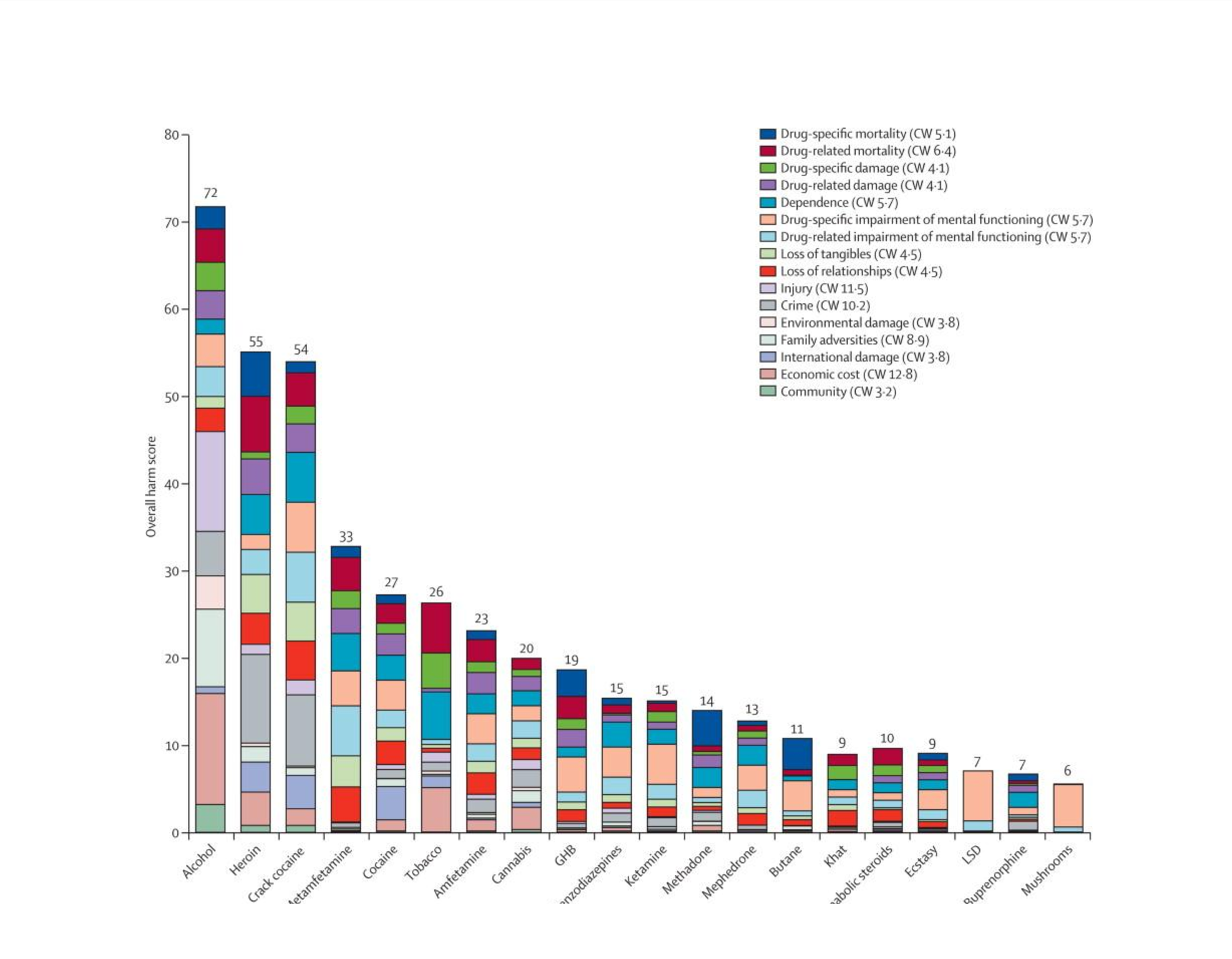Writers have pointed out on Volteface before that, as we discuss ‘drug policy’ it’s worth noting that the very concept of ‘drugs’ is flawed, and we shouldn’t even debate in these terms. But what does that mean for policymaking in practice, and how does it relate to current UK debates?
Before answering those questions, I should make clear a few of my assumptions. First, policy can be perfectly justifiable, or reasonable, without everyone agreeing with it. Second, the idea of evidence-based policy is a bit of a simplification, or even a fiction. When applied to a single issue or ‘problem’, it assumes simplicity of aims and causality that just isn’t realistic. There isn’t a single issue to be addressed in relation to ‘drug’ policy, and even if there was one single issue, there can’t be an agreed ‘solution’ that doesn’t then impact on a range of other policy areas or departments, such as the Treasury, Health, Business.
So moving on from my assumptions to what I really want to say. Generally, we think of UK policy prior to the 2016 Psychoactive Substances Act (PSA) as being based on an idea of harm: the Advisory Council on the Misuse of Drugs advised ministers how to regulate substances based on a scientific, objective assessment of the likely harm of those substances.
Of course, the reality has always been more complex than that. David Nutt was sacked for what he felt was simply speaking rational, objective truths about the harms of certain substances.
But that’s generally seen as a blip, or an example of politicians failing to live up to the ideals of academics and campaigners. It’s in that context that David Nutt has gone on to establish a “completely independent, science-led drugs charity” to ensure that there is “objective information on drug effects, harms and potential medical uses” to inform policymaking. He’s still committed to that model of rational, evidence-based policy based on ‘objective information’ about ‘drugs’.
Unfortunately, this ‘objective’ information on ‘harm’ turns out not to be terribly simple or easily understandable. The point here is that there are there are lots of possible forms that ‘harm’ could take. It could be harm to others, through use of the substance itself, as in passive smoking, or more indirectly through what Liam Donaldson called ‘passive drinking’.
It could be harm to the user directly – but this could take a variety of forms. Perhaps there’s a risk of death, disability or sickness. And these risks could be from chronic exposure to the substance, or from particularly severe or problematic acute exposure, or particular patterns of use, or through combination with other risky substances or behaviours. Generally, we worry about ‘drug’ deaths that are acute poisonings (or overdoses), but alcohol deaths are often due to chronic diseases, the result of heavy use sustained over several years. (Of course the rising numbers of drug deaths in the UK are partly due to chronic problems associated with substance use, be that alcohol or tobacco as well as opiates).

A further complication is that these harms aren’t guaranteed. As the police are fond of pointing out in relation to new psychoactive substances, using certain substances might be described (if you’re prone to more than a little exaggeration) as ‘Russian Roulette’. I’ve already used the word ‘risk’, and that’s the problem: we humans aren’t terribly good at understanding risk – as shown by the confused debate around the recent new alcohol consumption guidelines.
All this means that it’s difficult to put a single number on the harmfulness of a substance. And that shouldn’t be a surprise to any historian or sociologist of drugs – though for a slightly different reason.
Think about Howard Becker writing about learning to get high from marijuana; Mary Douglas talking about ‘constructive drinking’; Norman Zinberg talking about drug, set and setting; MacAndrew and Edgerton talking about ‘drunken comportment’; or Dwight Heath on the anthropology of alcohol use. All these authors note the importance of patterns of consumption and the culture or learned behaviour around substance use in determining both practices and harms.
This isn’t to deny that there are what might be called ‘objective’ effects of substances, but how these effects translate into harms isn’t straightforward. When considering the likely harm of a substance in a given society, we should be thinking about the norms around its consumption. This isn’t an original or blinding insight, but it is worth remembering, as it means that policy can’t – or rather shouldn’t – really be made on the basis of a purely scientific assessment of a substance’s properties.
So you can see that any attempt to compare the potential harm of different substances is fraught with difficulty. It will inevitably mean looking at a whole range of factors, and weighting them against each other – just look at the sheer number of colours David Nutt’s expert group had to use to identify all those potential harms.
 Thinking about harm involves balancing different issues and risks, and that’s before we even start thinking about balancing the harm against the pleasure, or the other potential advantages that might come to government through regulation, such as tax income. Just look how fractious debates about alcohol taxation and pricing are.
Thinking about harm involves balancing different issues and risks, and that’s before we even start thinking about balancing the harm against the pleasure, or the other potential advantages that might come to government through regulation, such as tax income. Just look how fractious debates about alcohol taxation and pricing are.
The point I’m trying to make is simply that, in 2016 at least, this was the ‘ideal type’ behind British drug policy. Aspiring to regulate drugs without pesky morality or ideology getting in the way; just focusing on independent, objective, scientific advice.
So what’s changed? What’s happening now? And why can we see the PSA as more positive than Ian Dunt did, for example, calling it ‘startlingly inane’?
Personally, I think it’s reasonable to explain the PSA as an attempt to respond pragmatically to a developing market in illicit substances, based on what is perceived to be a fast-moving, scientifically-advanced supply chain including labs in China and the dark net. All potentially frightening, exciting, and perceived as somehow very new.
However, partly because policymakers were trying not to complicate regulation or blur lines around other industries or products, we could say that this pragmatism has led to a fundamental change in how we understand drug policy. The overarching principle is no longer that drugs are regulated on the basis of their ‘harm’, but simply if they are deemed ‘psychoactive’ (or mind-altering, to use more everyday language).
The aim of this change is to identify issues before they arise. The practical problem was that until it got assessed, a new substance wouldn’t be classified under the law. What government has tried to do is something along the lines of setting up substances as guilty until proven innocent. But that guilt is established in relation to psychoactivity rather than its possible harm.
For lots of people this makes sense. A drug is something that has mind-altering effects, so if we’re looking to ban drugs, we should be identifying if substances have those mind-altering effects. If we just classify substances on the basis of whether they are ‘harmful’, then why would we use any different legislation to what is already available to protect consumers? What’s special about ‘drugs’?

But this approach is, quite reasonably, opposed by plenty of people, who feel that government shouldn’t be concerning itself with people’s choice to alter their mental state, unless it causes harm – specifically to other people in society, not just the user. This is an attempt to base policy on John Stuart Mill’s harm principle. The only problem is, of course, that as we’ve seen, harm is a pretty complicated, contestable concept, and we’ve not managed to agree on how to understand or apply this harm principle in over 150 years since Mill first wrote about it. But just as I attack the concept of ‘harm’ as being flawed, so we can attack ‘psychoactivity’. And plenty have – both commentators like Ian Dunt, and academics and practitioners in weighty journals. I’m going to assume readers are familiar with these arguments.
So if both harm and psychoactivity are flawed concepts, where’s the positive in the shift to the latter? Well, let’s just return to that idea that psychoactivity is a bit more familiar to people at root as a way of understanding what we mean by ‘drugs’.
If we take Toby Seddon’s argument that the only thing that holds together this group of substances called ‘drugs’ is the approach to regulation, and policymakers are saying they regulate drugs on the basis of ‘harm’, we have a flawed, but neat circle of logic to persuade people that ‘drugs are bad’. Drugs are the things that are regulated; we regulate things that cause harm; therefore drugs cause harm.
It’s very hard to argue yourself out of those logical steps. The argument becomes a technocratic one: yes, drugs are bad, and regulation is appropriate, but we’re regulating in the wrong way to reduce harm. This may well be true, and ‘regulation’ is a concept as problematic as ‘harm’, obscuring more than it illuminates, but this isn’t exactly a campaigning rallying cry. Much of politics is conducted in these platitudes or banalities (what exactly were people asking for when they sought to ‘take back control’?), but given that we live in a representative democracy, where the detail of policy (even after a referendum) has to be worked out by ministers and officials, the old adage of campaigning in poetry and governing in prose is surely applicable to ‘drug’ policy.
Of course, this is a simplistic version of how drug policy operates in practice. But I’d suggest that it is how plenty of people understand substances. They believe that substances wouldn’t be regulated if they weren’t harmful. Here, I’m not talking about users or suppliers of substances, who might be the people you’d think government is trying to influence. I’m talking instead about the wider electorate, who policymakers actually have more of an eye on as they think about drug policy, I’d suggest.
That is, we shouldn’t expect a political campaign or election manifesto to be drafted in technocratic language. It wouldn’t be a helpful way to communicate with voters. And that’s important because fear of the electorate seems to be a key influence on drug policy, both for politicians and civil servants, who are afraid of appearing ‘weak’ or ‘soft’.
So I’d suggest that while policy debates operate in that framework of ‘harm’, the possibilities for change are limited. And that’s where the PSA comes in as something that might stimulate a new direction in the debate. That reinforcing logical circle of “drugs are what’s regulated, we regulate things that are harmful, therefore drugs are bad” doesn’t hold up once ‘harm’ isn’t the organising principle. It turns into: “drugs are things that change your mental state; we regulate things that change your mental state”. There just isn’t any other logical step.

And that opens up questions that aren’t so obvious within a harm framework. If ‘drugs’ are simply things that alter your mental state, then there can be a discussion about whether this is bad in itself. It also helps highlight how the regulation of different mind-altering substances isn’t necessarily consistent – though I’d of course respond by noting that we have to take account of social context and history in how we make policy: alcohol – for better or worse – simply isn’t understood in the same way as most other psychoactive substances (for want of a better word).
Suddenly, that idea of Toby Seddon’s that open discussion and real change can only come if we challenge this concept of ‘drugs’, becomes a possibility. And of course, in an obvious but overlooked way we have actually already moved beyond the word ‘drugs’. It’s not just that ‘psychoactivity’ has replaced ‘harm’; rather than a Misuse of Drugs Act, we’re talking about a Psychoactive Substances Act. All this means we can potentially talk about the real ideological and moral positions that underpin current forms of drug regulation – again for better or worse.
What I would argue doesn’t move the debate forward is trying to define drugs in a perfect way or trying to refine measurements of ‘harm’ so we can have objective, rational drug policy. The whole idea is unachievable, even if the term ‘drugs’ made sense.
I think we can embrace these ideas of morality and uncertainty and have the debate on these terms. Policymaking might not be more scientific, independent, or objective, but it would be more open, understandable and honest, and it would be designed by and for real human beings. That’s not such a bad vision, after all.
Dr Will Haydock is a Visiting Fellow in the Faculty of Health and Social Sciences at Bournemouth University, Senior Health Programme Advisor for Public Health Dorset, and writes regularly on drug and alcohol use on his blog Thinking to some purpose. Tweets @WilliamHaydock
